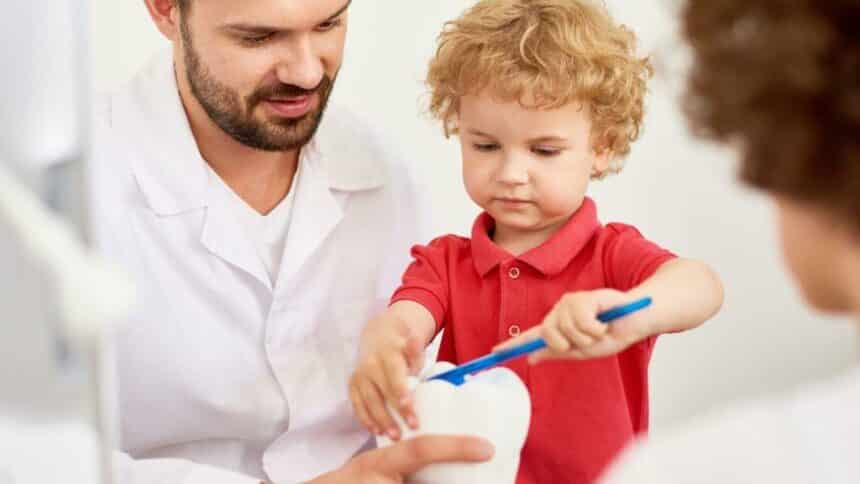More than 60% three-year-olds have never been to the dentist. Although this statistic improves as they get older, the most common reason for a first visit is advanced decay or the need to extract a tooth. This is a big mistake that exposes your child to stress and unnecessary pain, and you to costs. This can be avoided by caring for your child's teeth from an early age and visiting the dentist's surgery regularly. And when your child's first visit to the dentist in the UK should take place and what an adaptation visit looks like - find out in our article.
First tooth = child's first visit to the dentist in the UK
Baby teeth decay much faster than permanent teeth. Sometimes a deciduous tooth has to be removed two months after the onset of decay. This can cause abnormal eruption of permanent teeth and consequently malocclusion. This is another stress for the child, but also a considerable expense for braces.
So how to take care of your child's teeth - that's what you'll find out in our article. How do you look after milk teeth in children and why is it so important?
Good oral hygiene for toddlers does not expose him to unnecessary pain and unpleasant dental treatment. Worse still, if your child's first visit to the dentist in the UK is associated with the aforementioned pain it will be hard to convince your little one to go to the next one. This can cause fear, which will become greater and greater over time.
If you are already struggling with your child's reluctance to visit the dentist's office, we recommend our resource -. Fear of the dentist in a child - how to combat it?
Adaptation visit for children - what is it and why should you use it?
A good time to visit the dentist for the first time is when the first teeth are erupting. This is usually between the ages of 6 and 12 months. You may find that this is too early. However, it is not worth procrastinating and an adaptation visit for children is nothing scary.
It serves primarily getting the child accustomed to a place like the dentist's surgery. During such a visit, the toddler has the opportunity to see what the dentist's work is like. By showing the various instruments and talking about them in an interesting way, the doctor can win your child's trust.
It only takes a short while to assess a young child's oral health. During the first visit, he or she can then sit on your lap or, if he or she wishes, take a seat in the chair. The doctor will look at the teeth, gums and check the labial and sublingual frenulum.

The adaptation visit also provides an opportunity to talk to a specialist about proper care of your child's teeth. The dentist will help to choose toothbrushes and toothpastes and the right diet to protect against caries. The dentist should explain what to eat and which products to avoid in order to keep the child's teeth healthy and the bite to develop properly.
If you want to know right now what your child should eat and what it is better to avoid, we recommend our article Anti caries diet for children.

Like prepare for your child's first visit to the dentist in the UK?
Before your first visit, it is a good idea to talk to your child about where you are going and why. Do not build up unnecessary tension. Do not convey negative emotions or frighten your child with sentences such as "don't worry, it won't hurt". This already creates a subconscious fear of what may await them at the dentist's surgery.
Remember to calmly and matter-of-factly tell you what your child's first visit to the dentist in the UK will be like. What he should expect is that he can sit on your lap and, if he wants to, there is a special moving chair waiting for him and that you will check that his teeth are nice and clean. At home, you can also play dentist together beforehand.
And if you want your child's first visit to the dentist in the UK to be associated with a good -. make an appointment for an adaptation visit in our surgery. We will encourage your little one to make further regular visits and show them that they can involve not fear, but fun.
After each visit, children have the opportunity to choose a small gift for their bravery, encouraging them to visit the dental practice again.
If you have any questions, you can always reach us call or write. We also invite you to follow us on our channel on Facebook.


